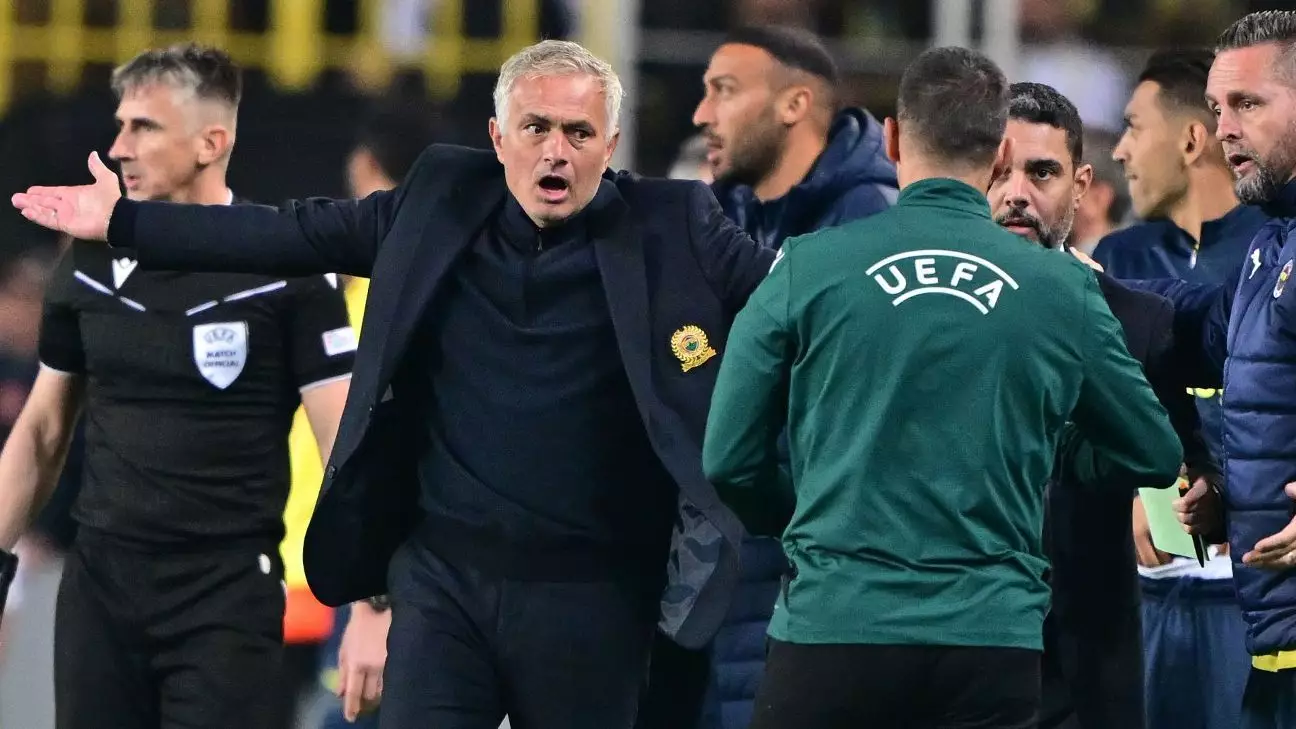Jose Mourinho, a name synonymous with footballing success and controversy, is an enigmatic figure whose career has taken him through various iconic clubs. Recently, he has voiced his frustrations regarding the treatment he feels he receives from UEFA compared to his peers in the coaching realm. This perception of unfair treatment stems from his tumultuous experiences during and after the 2023 Europa League final, leading to compelling reflections on accountability in football.
During the 2023 Europa League final, Mourinho’s Roma faced Sevilla in what turned out to be an agonizing encounter, culminating in a penalty shootout that left many fans and players disheartened. Following this heart-wrenching defeat, Mourinho’s frustrations boiled over, publically addressing referee Anthony Taylor, which resulted in a four-match touchline ban imposed by UEFA. Mourinho’s suspension highlighted the broader issue of how emotional pressures can incite outbursts, prompting discussions about the mental toll that high-stakes matches exact on coaches and players alike.
In a recent Sky Sports interview, Mourinho candidly expressed his grievances, feeling that ever since the Budapest final, he has been treated harshly. “I lost a final in a way that I still don’t accept,” he lamented, indicating that this loss has lingered in the back of his mind. This sentiment raises the question of how much emotional baggage a coach carries from such defining moments in their careers and how it can influence their future engagements in the sport.
One of Mourinho’s key points revolves around the concept of equal treatment for all coaches, regardless of their stature or experience. He declared, “I deserve to be treated like everybody else,” advocating for a standard of conduct that should apply uniformly across the coaching spectrum. This insistence on parity raises important considerations regarding the existing hierarchies within football culture.
In professional sports, star players and established coaches often enjoy a level of leeway in their behavior that newcomers do not. This disparity could suggest a systemic issue within the sport that allows experienced figures, such as Mourinho, to feel unjustly scrutinized, fostering a climate of resentment and alienation. Mourinho’s comments touch on a sentiment that resonates with many in high-pressure environments where the scrutiny can be relentless and unforgiving.
Following the heated match against Manchester United, where Mourinho was again sent off, he humorously mused that his next coaching position might have to be with an English club not involved in European competitions. Yet, he quickly clarified that he was joking, emphasizing that his intent is not to engage in relegation battles, which he deemed far too distressing. “It’s too hard! Honestly, I believe that has to be the hardest thing,” he exclaimed, drawing attention to the significant emotional strain that comes with avoiding relegation compared to competing for titles.
This admission illuminates the psychological pressures coaches face and presents a potential need for mental health awareness and support structures within football. While coaching at the highest level is often portrayed as a glamorous occupation, the reality often includes intense scrutiny and relentless stress, contributing to burnout and dissatisfaction.
Despite the ongoing challenges and frustrations, Mourinho’s ambition remains unshaken. He acknowledged his longing to return to the Premier League, stating, “London is home, so one day I have to be back.” This desire hints at a deeper emotional connection to his past experiences in England, where he achieved significant success. The prospect of returning to the Premier League, however, may not manifest for a few more years, likely due to the lessons learned from recent hardships.
Mourinho’s reflections illuminate the often-unseen struggles of coaching at the top level, highlighting a crucial narrative about mental health, fair treatment, and the emotional landscapes of high-stakes football. As he continues to navigate his career, the balance between seeking fairness and confronting the pressures of the game will undoubtedly shape his path moving forward, reiterating the complexity of being one of football’s most polarizing figures.

